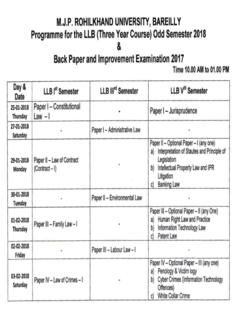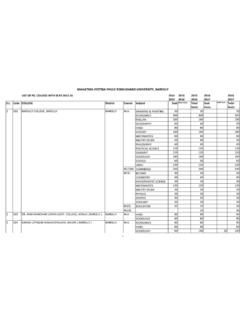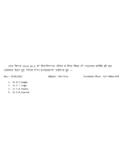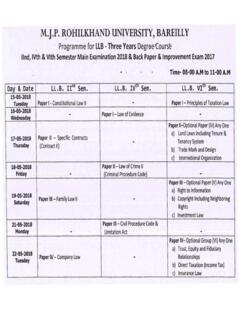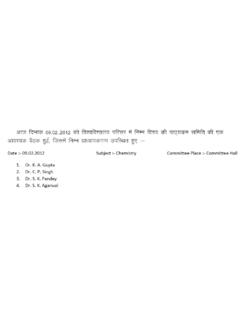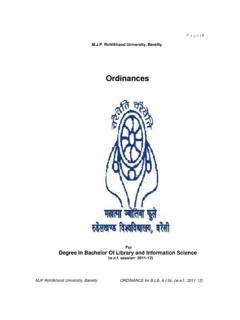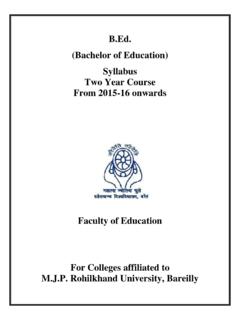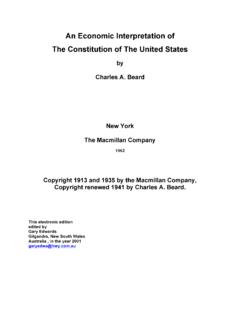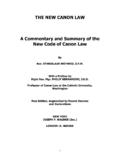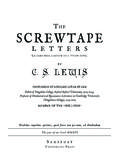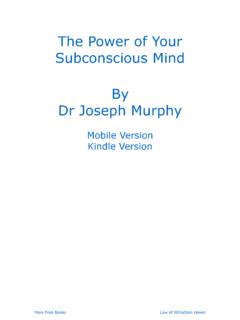Transcription of mjpru.ac.in
1 BACHELOR OF COMMERCE ( ). COURSE INPUT DETAILS. GROUP-A: PAPER-I COMPANY LAW. OBJECTIVE. The objective of this course is to provide basic knowledge of the provisions of the Companies Act. 1956, along with relevant case law. COURSE INPUTS. The Companies Act, excluding provisions relating to accounts and audit sections, managing agents and secretaries and treasurers Sections 324 - 388E, arbitration, compromises, arrangements and reconstructions - sections 389-396). UNIT I Corporate personality; Kinds of companies UNIT II Promotion on and incorporation of companies UNIT III Memorandum of Association; Articles of Association; Prospectus. UNIT IV Shares; sharecapital; Members; Share capital -transfer and transmission. UNIT V Capital management -borrowing powers, mortgages and charges, debentures. UNIT VI Directors -Managing Director, whole time director. UNIT VII Company meetings -kinds, quorum, voting, resolutions, minutes. UNIT VIII Majority powers and minority rights; Prevention of oppression and mismanagement.
2 UNIT IX Winding up - kinds and conduct Suggested Readings 1. Gower : Principles of Modern Company Law; Stevens & Sons, London. 2. Ramaiya A.: Guide to the Companies Act; Wadhwa & Co. Nagpur. 3. Singh Avtar: Company Law; Eastern Book Co., Lucknow. 4. Kuchal : Modern India Company Law; Shri Mahavir Books, Noida. 5. Kapoor : Company Law -Incorporating the Provisions of the Companies Amendment Act, 2000; Sultan Chand & Sons, New Delhi 6. Bagrial : Company Law; Vikas Publishing House, New Delhi. GROUP-A: PAPER-II COST ACCOUNTING. OBJECTIVE. This course exposes the students to the basic concepts and the tools used in cost accounting. COURSE INPUTS. UNIT I Introduction: Nature and scope of cost accounting; Cost concepts and classification;. Methods and techniques; Installation of costing system; Concept of cost audit. UNIT II Accounting for Material: Material control; Concept and techniques; Pricing of material issues; Treatment of material losses. UNIT III Accounting for Labour: Labour cost control procedure; Labour turnover; Idle time and overtime; Methods of wage payment - time and piece rates; Incentive schemes.
3 UNIT IV Accounting for Overheads: Classification and departmentalization; Absorption of overheads; Determination of overhead rates; Under and over absorption, and its treatment. UNIT V Cost Ascertainment: Unit costing; Job, batch and contract costing; Operating costing; Process costing - excluding inter-process profits, and joint and by-products. UNIT VI Cost Records: Integral and non-integral system; Reconciliation of cost and financial accounts. Suggested Readings 1. Arora : Cost Accounting-Principles and Practice; Vikas, New Delhi. 2. Jain and Narang : Cost Accounting; Kalyani New Delhi. 3. Anthony Robert, Reece, et at: Principles of Management Accounting; Richard D. Irwin Inc. Illinois. 4. Horngren, Charles, Foster and Datar: Cost Accounting - A Managerial Emphasis; Prentice-Hall of India, New Delhi. 5. Khan and Jain : Management Accounting; Tata McGraw Hill. 6. Kaplan Atkinson : Advanced Management Accounting; Prentice India International. 7.
4 Tulsian ; Practical Costing: Vikas, New Delhi. 8. Maheshwari : Advanced Problems and Solutions in Cost Accounting; Sultan Chand, New Delhi. 9. Jha : Cost Accounting, Kedar Nath Ram Nath, Meerut. GROUP-B: PAPER-III PRINCIPLES OF BUSINESS MANAGEMENT. OBJECTIVE. This course familiarizes the students with the basics of principles of management COURSE INPUTS. UNIT I Introduction: Concept, nature, process, and significance of management;. Managerial roles (Mintzberg); An overview of functional areas of management;. Development of management thought; Classical and neo-classical systems;. Contingency approaches. UNIT II Planning: Concept, process, and types. Decision making - concept and process;. Bounded rationality; Management by objectives; Corporate planning; Environment analysis and diagnosis; Strategy formulation. UNIT III Organizing: Concept, nature, process, and significance; Authority and responsibility relationships; Centralization and decentralization; Departmentation; Organization structure -forms and contingency factors.
5 UNIT IV Motivating and Leading People at Work: Motivation -concept; Theories -Maslow, Herzberg, McGregor, and Ouchi; Financial and non-financial incentives. Leadership - concept and leadership styles; Leadership theories (Tannenbaum and Schmidt.); Likert's System Management;. Communication -nature, process, networks, and barriers; Effective communication. UNIT V Managerial Control: Concept and process; Effective control system; Techniques of control -traditional and modern. UNIT VI Management of Change: Concept, nature, and process of planned change;. Resistance to change; Emerging horizons of management in a changing environment. Suggested Readings 1. Drucker Peter F: Management Challenges for the 21st Century; Butterworth Heinemann, Oxford. 2. Weihrich and Koontz, et al: Essentials of Management; Tata McGraw Hill, New Delhi. 3. Fred Luthans: Organizational Behaviour; McGraw Hill, New York. 4. Louis A. Allen: Management and Organisation; McGraw Hill, Tokyo.
6 5. Ansoff : Corporate Strategy; McGraw Hill, New York. 6. Hampton, David R: Modern Management; McGraw Hill, New York. 7. Stoner and Freeman: Management; Prentice-Hall, New Delhi. 8. Maslow Abraham: Motivation and Personality; Harper & Row, New York, 1954. 9. Hersey Paul and Blanchard Kenneth: Management of Organizational Behaviour - Utilizing the Human Resources; Prentice Hall of India, New Delhi. 10. Ibancevish and Matleson : Organizational Behaviour & Management; Irwin Homewood, Illinois. GROUP-C: PAPER-IV INCOME-TAX. OBJECTIVE. It enables the students to know the basics of Income Tax Act and its implications. COURSE INPUTS. UNIT I Basic Concepts: Income, agricultural income, casual income, assessment year, previous year, gross total income, total income, person; Tax evasion, avoidance, and tax planning. UNIT II Basis of Charge: Scope of total income, residence and tax liability, income which does not form part of total income. UNIT III Heads of Income: Salaries; Income from house property; Profit and gains of business or profession, including provisions relating to specific business; Capital gains; Income from other sources.
7 UNIT IV Computation of Tax Liability: Computation of total income and tax liability of an individual, Aggregation of income; Set-off and carry forward of losses; Deduction from gross total income. UNIT V Tax Management: Tax deduction at source; Advance payment of tax; Assessment procedures; Tax planning for individuals. UNIT VI Tax Administration: Authorities, appeals, penalties. Suggested Readings 1. Singhanai : Students' Guide to Income Tax; Taxmann, Delhi. 2. Prasad, Bhagwati: Income Tax Law & Practice ; Wiley Publication, New Delhi. 3. Mehrotra : Income Tax Law & Accounts ; Sahitya Bhawan, Agra. 4. Dinker Pagare: Income Tax Law and Practice ; Sultan Chand & Sons, New Delhi. 5. Girish Ahuja and Ravi Gupta: Systematic approach to income tax ; Sahitya Bhawan Publications, New Delhi. 6. Chandra Mahesh and Shukla : Income Tax Law and Practice; Pragati Publications, New Delhi. GROUP-C: PAPER-V FUNDAMENTALS OF ENTREPRENEURSHIP. OBJECTIVE. It provides exposure to the students to the entrepreneurial culture and industrial growth so as to preparing them to set up and manage their own small units.
8 COURSE INPUTS. UNIT I Introduction: The entrepreneur; Definition; Emergence of entrepreneurial class;. Theories of entrepreneurship; Role of socio-economic environment; Characteristics of entrepreneur; Leadership; Risk taking; Decision-making and business planning. UNIT II Promotion of a Venture: Opportunities analysis; External environmental anaysis - economic, social, and technological; Competitive factors; Legal requirements for establishment of a new unit, and raising of funds; Venture capital sources and documentation required. UNIT III Entrepreneurial Behaviour: Innovation and entrepreneur; Entrepreneurial behavior and Psycho-Theories, Social responsibility. UNIT IV Entrepreneurial Development Programmes (EDP): EDP, their role, relevance, and achievements; Role of Government in organizing EDPs; Critical evaluation. UNIT V Role Of Entrepreneur: Role of an entrepreneur in economic growth as an innovator, generation of employment opportunities, complimenting and supplementing economic growth, bringing about social stability and balanced regional development of industries; Role in export promotion and import substitution, forex earnings, and augmenting and meeting local demand.
9 Suggested Readings 1. Tandon : Environment and Entrepreneur; Chugh Publications, Allahabad. 2. Siner A David: Entrepreneural Megabuks; John Wiley and Sons, New York. 3. Srivastava S. B: A Practical Guide to Industrial Entrepreneurs; Sultan Chand and Sons, New Delhi. 4. Prasanna Chandra: Project Preparation, Appraisal, Implementation; Tata McGraw Hill, New Delhi. 5. Pandey : Venture Capital - The Indian Experience; Prentice Hall of India. 6. Holt: Entrepreneurship-New Venture Creation; Prentice Hall of India. 7. Shukla, ; Entrepreneurship. GROUP-C: PAPER-VI PUBLIC FINANCE. OBJECTIVE. The Objective of this course is to provide basic knowledge about various intricacies for public finance. COURSE INPUTS. UNIT I Meaning & Scope of Public Finance Public goods vs. Private goods , Principle of Maximum Social Advantage, Public Budget , Techniques of Budgeting(ZBB PBB), Deficit Financing. UNIT II Public Expenditure: Meaning & Nature, Wagner's views on increasing state activities Wiseman-peacock hypothesis, Canons and classification of public expenditure effects on production, distribution and economic stability.
10 UNIT III Public Revenue: Main sources of revenue, Tax revenue , Direct and Indirect Taxes, Progressive, proportional & Regressive Taxes, Value added tax, The Division of tax burden, Incidence of a tax, effects on production & distribution. UNIT IV Public Debts: Role and classification of Public debts and methods of their redemption. UNIT V Indian Public Finance: Financial Federalism under constitution, Financial Adjustments in India, Finance Commission, review of Indian Tax System. Budgetary Procedure and Financial Control in India. Suggested Readings 1. Pigou ; A study of public finance. 2. Bhargava, : Theory and practice of public finance. 3. Saxena and Mathur: Public economics 4. Plaion: Public Finance. GROUP-C: PAPER-VII INDUSTRIAL LAW. OBJECTIVE. The purpose of this paper is to orient students about industrial rules and regulations. COURSE INPUTS. THE FACTORIES ACT: Importance, Definitions, Provisions of the Factories Act relating of Health, Safety and welfare of the workers Working hours of Adults and Young persons.

